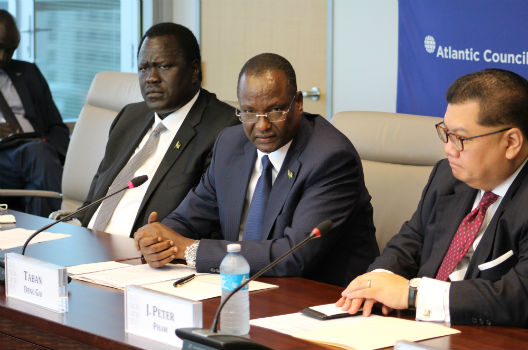 On Wednesday, August 28, the Atlantic Council’s Africa Center hosted His Excellency Taban Deng Gai, first vice president of the Republic of South Sudan, to provide an update on the political situation in the country as well as the continuing conflict.
On Wednesday, August 28, the Atlantic Council’s Africa Center hosted His Excellency Taban Deng Gai, first vice president of the Republic of South Sudan, to provide an update on the political situation in the country as well as the continuing conflict.
After an introduction from Africa Center Director Dr. J. Peter Pham, Deng discussed recent events in South Sudan, including a violent flare-up in July at the presidential palace where rival factions of the Sudan People’s Liberation Army clashed. Deng maintained that the government was functioning and the country was stable and peaceful. He rejected the idea of external intervention in South Sudan and insisted that stability could only be introduced by the South Sudanese themselves.
In the discussion that followed his prepared remarks, participants asked about the murky circumstances surrounding the flight of former First Vice President Riek Machar from the capital of Juba and Taban Deng’s appointment in his place; the recent Sentry report detailing massive corruption among South Sudan’s political elite; the tension between touting the country’s sovereignty while simultaneously requesting that the US fund military and police capacity-building efforts as well as continue humanitarian assistance; the status of the regional protection force to which the government has agreed; and the economic forecast for the country amid low oil production and prices.
The delegation also included H.E. Garang Diing Akuong, ambassador to the United States; H.E. Ezekiel Gatkuouth, minister of petroleum; H.E. Kol Manyang Juk, minister of defense; H.E. Deng Alor Kuol, minister of foreign affairs; and H.E. Hussein Mar, minister of humanitarian affairs.
Read more on the New Atlanticist: “South Sudan’s First Vice President Blames Roads, Criminals for Blocking UN Efforts”
